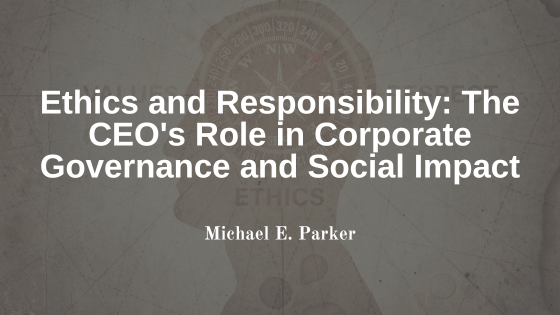In today’s rapidly evolving business landscape, the role of a CEO extends far beyond maximizing profits. It encompasses a broader responsibility towards corporate governance and social impact. But what exactly does this mean, and why is it essential for CEOs to embrace ethics and responsibility in their leadership roles?
Corporate Governance: Beyond the Boardroom
Corporate governance refers to the framework of rules, practices, and processes by which a company is directed and controlled. Traditionally, this has been seen as the domain of boards of directors and regulatory bodies. However, in recent years, CEOs have emerged as central figures in shaping corporate governance.
A CEO’s influence on corporate governance is profound. They set the tone for the entire organization. Ethical leaders establish a culture of integrity, transparency, and accountability, which filters down through all levels of the company. This culture is not just about adhering to rules but about doing what is morally right, even when no one is watching.
The Social Impact Imperative
Beyond governance, CEOs are increasingly expected to be stewards of social impact. This means considering the consequences of business decisions on society at large. It involves environmental sustainability, ethical supply chain practices, diversity and inclusion, and community engagement.
For instance, CEOs have a critical role in driving sustainable business practices. They can champion environmentally friendly initiatives, reduce the company’s carbon footprint, and invest in renewable energy sources. These actions not only benefit the planet but also resonate with consumers who increasingly prefer eco-conscious companies.
Balancing Profit and Purpose
CEOs often find themselves navigating the delicate balance between maximizing profits for shareholders and serving a broader social purpose. The key is recognizing that these goals are not mutually exclusive. In fact, businesses that align their values with societal needs tend to perform better in the long run.
Consider the example of Patagonia, an outdoor clothing company. Its CEO, Rose Marcario, made a commitment to donate a percentage of the company’s profits to environmental causes. This move not only resonated with customers but also attracted top talent who shared the company’s values. Consequently, Patagonia’s profits grew significantly, demonstrating that ethics and profit can go hand in hand.
The Bottom Line: Accountability
In the modern corporate landscape, CEOs must be accountable not only to shareholders but to a broader spectrum of stakeholders. This includes employees, customers, communities, and the environment. A responsible CEO recognizes that their decisions have far-reaching consequences and acts accordingly.
The role of a CEO has evolved to encompass more than just profit-making. Today, CEOs are at the helm of corporate governance and social impact. Embracing ethics and responsibility isn’t just a moral imperative; it’s a strategic advantage that can drive long-term success. By leading with integrity and considering the impact of their actions on society, CEOs can steer their companies toward a brighter, more sustainable future.
